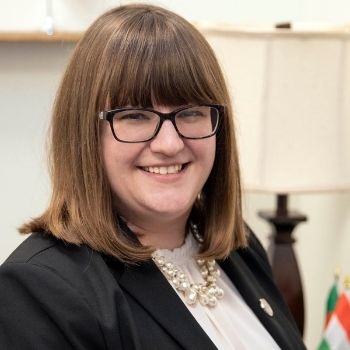Preparing New Lawyers for 21st Century Challenges
J. Nicole Alanko is a 2018 graduate of the Law School. She is an Immigrant Justice Corps Fellow in the Immigration Clinic. This essay originally appeared in the December 2021 issue of the Virginia Lawyer, a publication of the Virginia State Bar. It is reprinted here with permission.
 I first learned about the Citizen-Lawyer ethos on the top floor of a law firm in Washington, D.C., overlooking the White House and the Washington Monument. I was attending an accepted students’ event on a Wednesday night in March of my last year of college. The former Dean of William & Mary Law School opened the event by speaking about the founding of William & Mary Law School as the first law school in the United States and its role in the country’s founding. He described how being a “citizen lawyer” meant not just being someone who knew the law but who used the law to advance justice and help others, no matter the job or area of practice. I knew at that moment that I wanted to be part of this tradition.
I first learned about the Citizen-Lawyer ethos on the top floor of a law firm in Washington, D.C., overlooking the White House and the Washington Monument. I was attending an accepted students’ event on a Wednesday night in March of my last year of college. The former Dean of William & Mary Law School opened the event by speaking about the founding of William & Mary Law School as the first law school in the United States and its role in the country’s founding. He described how being a “citizen lawyer” meant not just being someone who knew the law but who used the law to advance justice and help others, no matter the job or area of practice. I knew at that moment that I wanted to be part of this tradition.
Being a citizen lawyer in the twenty-first century does not mean the same thing it meant to Jefferson. I and many of my colleagues would not have been able to be lawyers in Jefferson’s world. Jefferson and his successors in law and government never imagined the legal questions that a citizen lawyer in 2021 would have to answer.
At William & Mary, training law students to be citizen lawyers is not a notion that remains in the past. My classmates and I were challenged to not only learn what the law is or what the law could be, but to find our voices to advocate for ourselves and others. We could only do this through the guidance and mentorship of an incredible cadre of faculty and staff.
In doctrinal classes, my professors challenged me not only to learn what the law was, but to ask where it was going and where it should go. Professor Vivian Hamilton wasn’t just challenging me to learn Rules 8(a) and 12(b)(6), but to ask how these rules changed the kinds of cases that were heard or were not heard. In my work with the Domestic Violence and Family Law Clinics, my supervising attorneys Darryl Cunningham and Lindsay Barna pushed me to speak up in court, even when my voice shook. They also brought me into “the room where it happens” to be part of the broader community assisting survivors of violence. And Judge J.R. Zepkin’s insistence on protecting the record for appeal during my Virginia Civil Procedure class gave me the strength I needed to speak up during my first trial after graduating. The lessons I learned have been fundamental to my work to this day. It’s only through all these experiences that I built the skills I needed to become the citizen lawyer I always wanted to be.
I am eternally grateful for the opportunity to now be part of the ranks that had made such an impact on me. As an Immigrant Justice Corps Fellow in the William & Mary Law School Immigration Clinic, I can pay forward what my professors and mentors did for me. Now, I am part of the tradition of preparing the next classes of lawyers to answer twenty-first century questions with the conviction of a citizen lawyer.
About William & Mary Law School
Thomas Jefferson founded William & Mary Law School in 1779 to train leaders for the new nation. Now in its third century, America’s first law school continues its historic mission of educating citizen lawyers who are prepared both to lead and to serve.